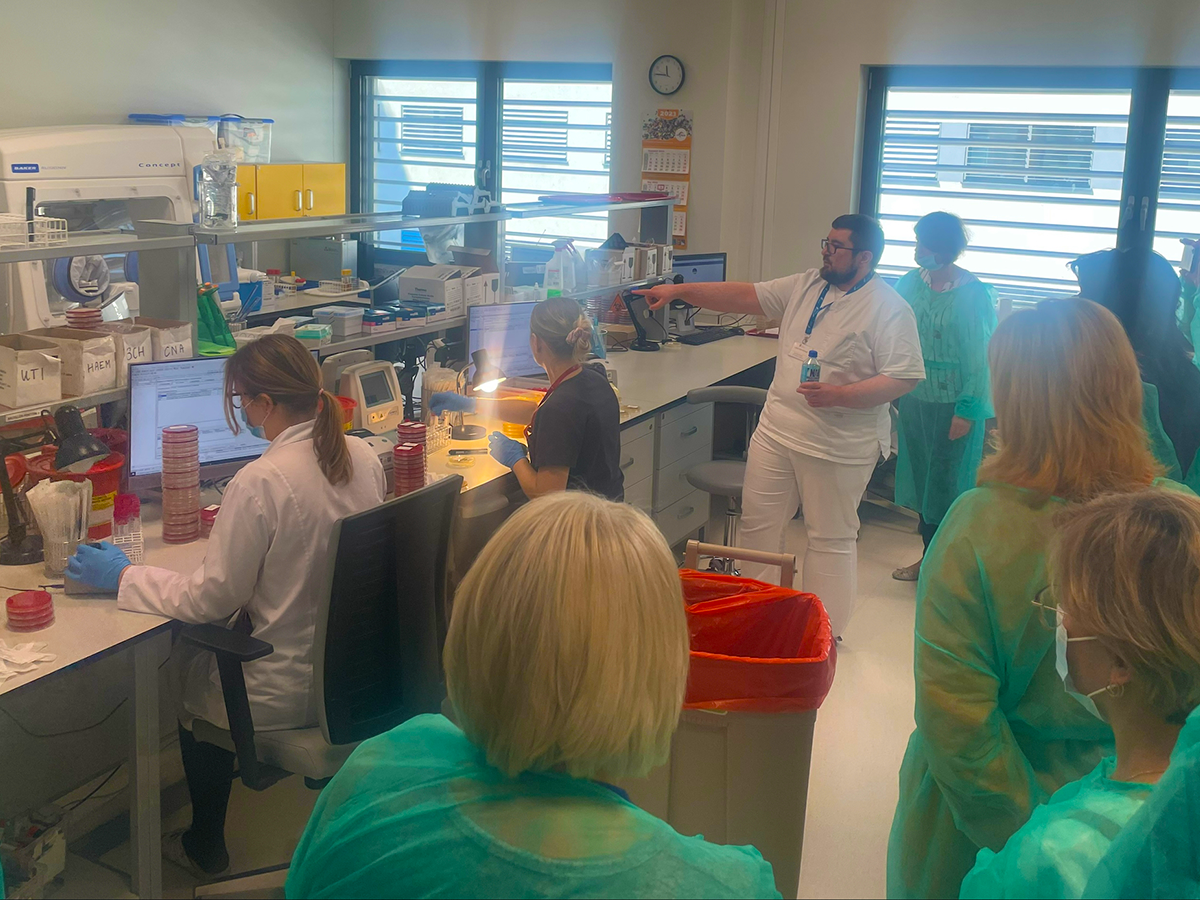Before the Russian invasion of Ukraine, studies on antimicrobial resistance showed infections from drug-resistant bacteria as a considerable threat to human health. According to a study on health care-associated infections in 17 Ukrainian regional hospitals from 2019 to 2021, 85.1 percent were from multidrug-resistant organisms (MDROs). With the raging war, global health experts believe antimicrobial resistance (AMR) in Ukraine is now worse off.
“With the rise in traumatic wounds and overburdened health care system, we are seeing increased detection of MDROs in Ukraine and transmission in Europe,” said Andrea Howard, MD, MS, director of ICAP’s Clinical and Training Unit, who is leading ICAP’s stream of work in Ukraine. “Technical assistance to prevent, detect, and respond to AMR is needed to improve health outcomes within Ukraine and limit the international spread.”
ICAP has been supporting the Ukraine Recovery Project – a global health security initiative funded by the U.S. Centers for Disease Control and Prevention (CDC) – to combat this health threat since October 2022. Under the project, ICAP supports AMR activities, which include laboratory detection, antimicrobial stewardship, and infection prevention and control (IPC), as well as laboratory-based sentinel surveillance, environmental surveillance, and laboratory systems strengthening. To implement project activities, ICAP collaborates closely with the Center for Public Health of the Ukraine Ministry of Health (UPHC), regional centers for disease control (rCDCs), and multispecialty hospitals in the Vinnytsia, Ternopil, and Khmelnytskyi regions.
“We are utilizing a multipronged approach to support national AMR response efforts,” said Anna Deryabina, MD, DrPH, MScIH, ICAP’s regional director for Eurasia. “We are building the capacity of hospital and above-site multidisciplinary teams, supporting surveillance for healthcare-associated infections and AMR to inform clinical care, upgrading laboratory equipment and procedures, and strengthening IPC programs,” she said.
ICAP is also supporting technical training that includes clinical and laboratory twinning between international AMR experts and Ukrainian clinicians and laboratorians. On May 10, 2023, ICAP organized a visit for Ukrainian colleagues to the microbiology laboratory of the University Hospital in Krakow, Poland, to support building diagnostic capacity for pathogen identification and antimicrobial susceptibility testing at their respective laboratories. Participants included bacteriologists and quality specialists from Khmelnytskyi City Hospital, Ternopil Regional Clinical Hospital, Vinnytsia Regional Clinical Hospital, the rCDCs in Khmelnytskyi, Ternopil, and Vinnytsia Oblasts, and the Ukraine Center for Public Health.
During the visit, participants learned about laboratory staffing, regulations, ISO accreditation, waste management, purchasing procedures, laboratory equipment, laboratory information system, standards for susceptibility testing, and communication with clinicians. They also toured the laboratory facilities and observed specimen processing procedures. “The visit was very informative. I liked how the microbiological laboratory was organized with modern equipment and ready-made nutrient media,” said Tetiana Mota, a Khmelnytskyi City Hospital bacteriologist.
To continue building the capacity of the Ukrainian laboratories, ICAP has also established a community of practice that convenes biweekly calls. In the future, ICAP will be procuring equipment and supplies for public health and hospital laboratories to enhance diagnostic capacity for pathogen identification and antimicrobial susceptibility testing, with improved turnaround time, so staff can detect and respond to AMR organisms, ensure appropriate antibiotic use, and improve management of traumatic wound infections.
About ICAP
A major global health organization that has been improving public health in countries around the world for two decades, ICAP works to transform the health of populations through innovation, science, and global collaboration. Based at Columbia Mailman School of Public Health, ICAP has projects in more than 40 countries, working side-by-side with ministries of health and local governmental, non-governmental, academic, and community partners to confront some of the world’s greatest health challenges. Through evidence-informed programs, meaningful research, tailored technical assistance, effective training and education programs, and rigorous surveillance to measure and evaluate the impact of public health interventions, ICAP aims to realize a global vision of healthy people, empowered communities, and thriving societies. Online at icap.columbia.edu








